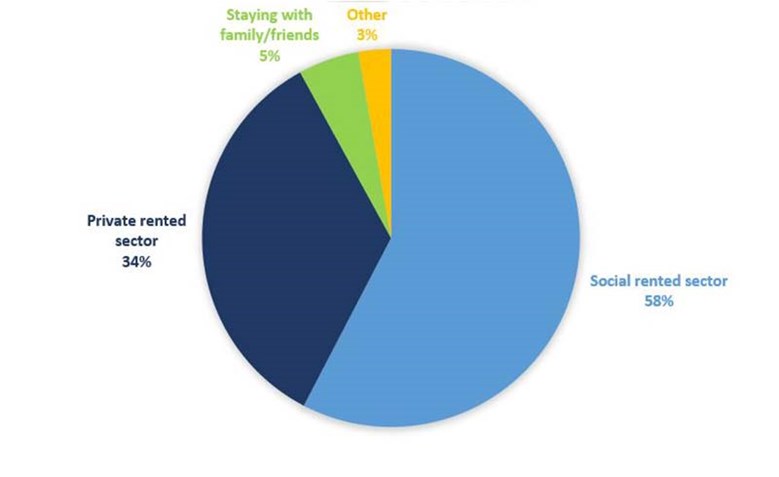Preventing Homelessness in Exeter
Published: 22 April 2022

Preventing Homelessness in Exeter – Frequently Asked Questions
Most people know they can contact their local council if they become homeless. However Exeter City Council’s Housing Options team also want to hear from you if you are at risk of losing your home, so that we can provide you with help and advice to help you stay in your home, or find a new home if you are unable to remain in your current home.
The information below will let you know what steps you can take if you feel you are at risk of becoming homeless and what help you can expect to receive from the Council if you are at risk of becoming homeless.
Q1 - What is Homeless Prevention?
Homeless prevention means working with households before they become homeless, either by helping them to stay in their current home or by helping to find alternative accommodation that is suitable for the needs of everyone in the household.
The Homelessness Reduction Act 2017 introduced a new legal duty - the ‘prevention duty’ - for local authorities to help households before they reach the point of homelessness. We will explain the different ways that the Council can support you if you are at risk of homelessness in the rest of this newsletter.
Q2 - What do we mean by ‘at risk of homelessness’?
Being at risk of homelessness doesn’t just mean receiving a ‘Notice to Quit’ or being asked to leave your home. As well as these things, it can also mean:
- That your current home is overcrowded
- That you can no longer afford your current home
- That you or someone else in your household is at risk of domestic violence or other violence in your current home
- That your current home is temporary and you do not know where you will live next (for example if you staying temporarily with friends or family)
If you are worried that you may lose your home for any reason, we want to hear from you. See Q4 to find out how to contact us.
Q3 - So what can the Housing Options team do to help?
There are a number of different ways that the Council can help depending on your circumstances.
If you are able to remain in your existing home:
We can provide financial advice and support to resolve affordability issues, including:
- Help to access benefits and debt advice
- Help to access benevolent funds
- Help to deal with rent arrears to prevent eviction
- Assessing the possibility of a one-off payment, such as a loan or grant, to resolve a housing situation
We can also negotiate with family members, friends or your landlord to try to arrange for you to remain in your existing home.
If you are not able to remain in your existing home:
We will advise you what your housing options are and the steps that need to be taken, by you and by the council, to help you secure a new home. Some of the things we can help with include:
- Giving you advice on how to look for suitable private rented properties
- Referrals to supported accommodation projects
- Considering whether we can support you financially, with a loan or grant, with rent in advance and deposit payments for private and social rented properties
- In some circumstances we may be able to assist, either with a loan or grant, to help to pay for white goods and furniture
Q4 - How do I contact the Housing Options team if I am at risk of homelessness?
The quickest way to contact us is using our online form available here: Contacting us for housing advice - Exeter City Council. Alternatively you can contact us by email or telephone: housing.advice@exeter.gov.uk / 01392 265726.
If someone else is at risk of homelessness:
You can contact us on behalf of someone else who is at risk of losing their home as long as you have their consent to do so.
If you are a professional supporting someone who is at risk of homeless please contact us via our dedicated professionals referral form: Professionals only – Referring your client - Exeter City Council
Q5 - What happens when I contact the Housing Options team?
- One of our officers will get back to you to discuss your circumstances in more detail – usually within one working day if you contact us via our online form.
- If your circumstances are not something the Housing Options team can help with, our officers will tell you about other organisations that might be able to help you.
- If your circumstances are something the Housing Options team can help with, our officers will arrange an appointment with one of housing officers for you at a time and date that suits you. Please note that most of our appointments are via telephone – please let our officers know if you will not be able to complete an appointment on the telephone.
- During your appointment, your housing officer will complete an assessment so that they understand all of your circumstances. They will then advise you what your housing options are and the steps that need to be taken to prevent you from becoming homeless.
- Normally you will carry on working with your housing officer until you are no longer at risk of homelessness. However, there may be some circumstances where we stop working with you before this time, for example because we have lost contact with you despite our trying to reach you or you have refused a suitable offer of accommodation. This could be an offer of social or private rented housing or other accommodation that is expected to last for 6 months or more.
Q6 - What support can I expect to get from my housing officer to help prevent my homelessness?
Your housing officer will work with you to develop a plan called a Personal Housing Plan (‘PHP’). This personalised plan will outline the housing options that are suitable for the circumstances and needs of you and your family. Your personalised plan will also explain the actions that need to be taken to prevent your homelessness. There will be actions for you and actions for your housing officer.
Actions for you might include:
- Working with financial services to help resolve benefit or debt issues, or maximise your income
- Demonstrating that you have been actively searching for private rented properties
- Working with your GP or other health professionals supporting you, and any other support services that are relevant to the needs of you and your household
Q7 - What happens if we cannot help you to prevent your homelessness?
If a household becomes homeless while we are working with them to prevent their homelessness, we will carry on working with them to resolve their homelessness. This is called the ‘relief duty’ as it is the duty to ‘relieve’ homelessness. We will provide more information about the relief duty in a future newsletter.
Q8 - Can’t I just register on Devon Home Choice if I’m at risk of homelessness?
Although Devon Home Choice is one of the housing options your housing officer might discuss with you depending on your circumstances, it is not a quick solution to homelessness or risk of homelessness.
- As at 1st April 2022, there were 3131 Exeter-based applicants on Devon Home Choice with a housing need. The average number of days wait time for Exeter-based applicants who secured a property on Devon Home Choice in 2021 was 488 days. Therefore, your housing officer will always consider housing options that will resolve your risk of homelessness more quickly, such as private rented housing.
- The average number of days wait time for Exeter prevention households who were helped to secure a private rented property in 2021 was 78 days.
Q9 - Isn’t it more important to help people who are already homeless?
Exeter is still working with homeless households to help them find a new home. See our FAQs article on our work to help those rough sleeping in Exeter: Rough Sleeping and Single Homelessness in Exeter - Exeter City Council News
Q10 - How many households have you prevented from becoming homeless in Exeter?
From 1st April 2021 – 31st March 2022*, the Housing Options team prevented 288 households from becoming homeless. The type of home that was secured is shown in the chart below.

Of these 288 households, 79 (27%) were assisted to remain in their current home.
*Please note that 2021-22 Q4 data is still being finalised and so is subject to minor change.
Q11 – How can I help?
- Spread the word!
We want to make sure that households in Exeter know they can approach us if they are worried about losing their home.
- Get in touch as soon as possible.
As we have mentioned in this newsletter, finding new accommodation takes time due to the high demand for private and social rented housing and supported accommodation projects in Exeter. The sooner you get in touch, the more time it gives us to help you find a new home.
